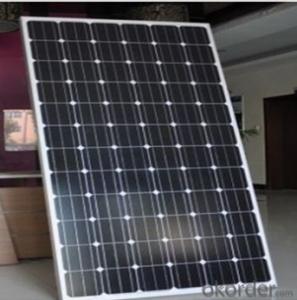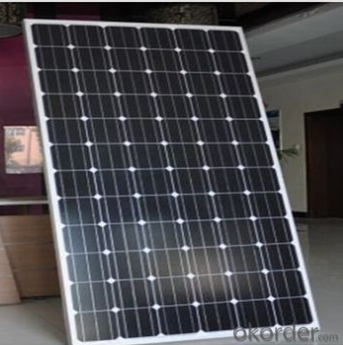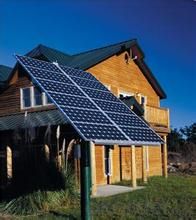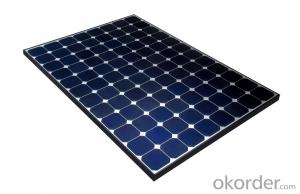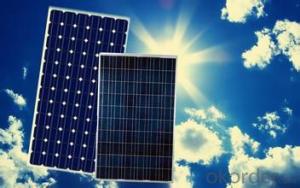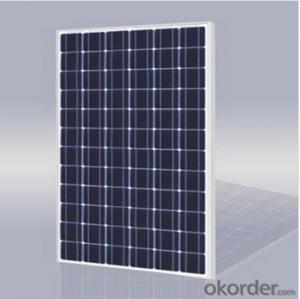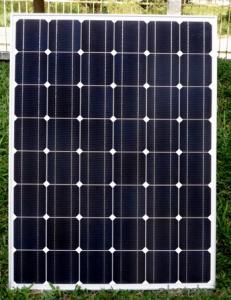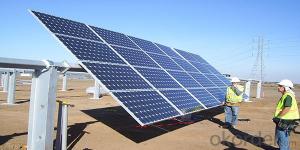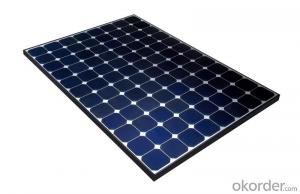140kw CNBM Monocrystalline Silicon Solar Energy Systems Panel for Home Use in Brooklyn
- Loading Port:
- Tianjin
- Payment Terms:
- TT OR LC
- Min Order Qty:
- 20 watt
- Supply Capability:
- 1000 watt/month
OKorder Service Pledge
OKorder Financial Service
You Might Also Like
Specification
140KW CNBM Monocrystalline Silicon Panel for Home Using
Production description
Garden Television (HGTV) network. Actress Daryl Hannahpromotes off-grid living and constructed her home in Colorado according to those principles, as does survival expert and Dual Survival co-star Cody Lundin,[3]who lives in a self-designed, passive solar earth house in the high-desert wilderness of Northern Arizona, collecting rainwater, composting waste, and paying nothing for utilities.[4][5]
The large magnitude of solar energy available makes it a highly appealing source of electricity. The United Nations Development Programme in its 2000 World Energy Assessment found that the annual potential of solar energy was 1,575–49,387 exajoules (EJ). This is several times larger than the total world energy consumption, which was 559.8 EJ in 2012.
Electrical power can be generated on-site with renewable energy sources such as solar (particularly with photovoltaics), wind, micro hydro, geothermal; with agenerator or Micro combined heat and power with adequate fuel reserves. Such a system is called a stand-alone power system. In addition, it is possible to simply eliminate electric power such as in Old Order Amish and Old Order
On-site water sources can include a well, stream, or lake. Depending on the water source, this may include pumps and/or filtration. Rainwater can also be harvested. Filters can be advanced running off an energy source of boiling .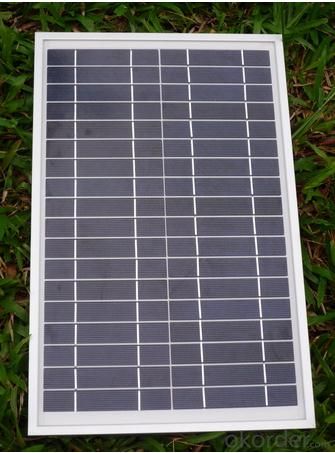
Feature
1.High conversion efficiencies resulting in superior power output performance.
2.Outstanding power output even in low light or high temperature conditions
3.Optimized design for ease of soldering and lamination
Physical characteristic
1. Rigorous quality control meets the highest international standards.
2. High-transmissivity low-iron tempered glass, strong aluminium frame.
3. Using UV-resistant silicon.
4. IS09001/14001/CE/TUV/UL
Packaging
26pcs in one carton 6pallets in 20foot container 14pallets in 40 foot container.
- Q: How do solar energy systems impact electricity bills?
- Solar energy systems can significantly reduce electricity bills by generating free, clean energy from the sun. By harnessing solar power, homeowners and businesses can offset a portion or even the entirety of their electricity usage, leading to substantial savings on their monthly bills. Additionally, excess electricity generated by solar panels can be fed back into the grid, resulting in further financial benefits through net metering or feed-in tariffs.
- Q: How does temperature affect the efficiency of solar panels?
- Temperature affects the efficiency of solar panels by causing a decrease in their overall performance. As temperature rises, the efficiency of solar panels tends to decrease due to the negative impact on the photovoltaic cells. This decrease in efficiency is mainly caused by an increase in electron resistance within the cells, leading to a reduction in the conversion of sunlight into electricity. Therefore, it is crucial to consider and manage the temperature of solar panels to optimize their efficiency and maximize energy production.
- Q: Can solar energy systems be used for desalination of water?
- Yes, solar energy systems can be used for the desalination of water. Solar-powered desalination systems harness the energy from the sun to power the desalination process, which removes salt and impurities from seawater or brackish water, making it suitable for various applications such as drinking, irrigation, or industrial use. These systems typically utilize solar panels to generate electricity, which then powers the desalination equipment, such as reverse osmosis membranes or solar stills, to separate freshwater from saltwater. This sustainable and renewable approach offers a promising solution for addressing water scarcity issues in regions with ample sunlight and limited freshwater resources.
- Q: Can solar energy systems be used in powering dental clinics or medical clinics?
- Certainly, dental clinics or medical clinics can indeed utilize solar energy systems to generate power. Solar energy, a clean and sustainable power source, can be harnessed through photovoltaic (PV) panels to produce electricity. These panels convert sunlight into usable energy, which can then be utilized to operate various electrical equipment and appliances in dental or medical clinics. Typically, dental and medical clinics require a substantial amount of electricity for their operations, including lighting, air conditioning, medical equipment, computers, and other electrical devices. By installing solar panels, these clinics can decrease their reliance on the traditional power grid and lower their electricity expenses. Solar energy systems can be tailored to meet the specific energy requirements of dental or medical clinics, ensuring smooth and efficient functioning. The electricity generated by solar panels can be optimized by analyzing the clinic's energy consumption patterns and installing an appropriate number of solar panels to meet the demand. Moreover, besides the cost savings, employing solar energy systems also offers environmental advantages. Solar power is a clean energy source that does not produce any greenhouse gas emissions or air pollutants during operation. By transitioning to solar energy, dental and medical clinics can decrease their carbon footprint and contribute to a healthier environment. Additionally, solar panels have a long lifespan and require minimal maintenance, making them a dependable and resilient energy solution for dental and medical clinics. With proper installation and regular inspections, solar energy systems can provide a consistent and uninterrupted power supply for many years. All in all, solar energy systems present a practical and feasible choice for powering dental or medical clinics. They provide cost savings, environmental benefits, and a reliable electricity source, enabling clinics to operate efficiently while minimizing their impact on the environment.
- Q: How does the efficiency of solar panels vary across different angles of sunlight?
- The efficiency of solar panels can vary across different angles of sunlight due to several factors. One factor is the incident angle of sunlight. Solar panels are most efficient when sunlight strikes them perpendicular to their surface. As the angle of sunlight becomes more oblique, the energy output of the panels decreases. This is because when sunlight strikes the panel at an angle, it has to travel a longer distance through the material, resulting in more absorption and reflection, and less energy conversion. Another factor is the tracking system of solar panels. Some solar panels have tracking systems that allow them to follow the sun's movement throughout the day, optimizing the angle of incidence. These tracking systems can significantly increase the efficiency of solar panels, as they ensure that the panels are always aligned with the sunlight, maximizing the energy output. Furthermore, the efficiency of solar panels can also be affected by the type of solar cell technology used. Different types of solar cells have varying sensitivities to the incident angle of sunlight. For example, monocrystalline silicon solar cells tend to have higher efficiencies at steeper angles of sunlight compared to polycrystalline or thin-film solar cells. In summary, the efficiency of solar panels can vary across different angles of sunlight due to factors such as incident angle, tracking systems, and the type of solar cell technology used. Optimizing the angle of incidence and implementing tracking systems can help maximize the efficiency of solar panels and increase their energy output.
- Q: Can a solar energy system be installed in a remote location?
- Yes, a solar energy system can be installed in a remote location. Solar panels can be set up in areas that are far from the electric grid, allowing for the generation of clean and renewable energy in remote and isolated places. These systems can provide power for various purposes, including residential, commercial, and even off-grid applications such as remote cabins, research stations, or telecommunications infrastructure. As long as there is sufficient sunlight, a solar energy system can be installed and provide a reliable source of electricity in remote locations.
- Q: What are the advantages of solar energy systems?
- Solar energy systems offer several benefits. To begin with, solar energy is an endless source of power, relying on the sun's continuous existence. This stands in stark contrast to finite fossil fuels, which are depleting rapidly. Furthermore, solar energy is environmentally conscious. Unlike fossil fuels, solar energy systems do not release harmful greenhouse gases or pollutants that contribute to climate change and air pollution. This makes solar energy a clean and sustainable alternative that aids in reducing our carbon footprint and countering the adverse effects of global warming. Moreover, solar energy systems can significantly decrease electricity expenses. Once the initial investment in solar panels is made, the cost of harnessing solar energy remains relatively low. Solar energy is essentially free, with the only expenses being equipment maintenance and occasional repairs. This can result in substantial long-term savings on energy bills, especially considering the continuous rise in traditional electricity costs. Additionally, solar energy systems promote energy independence. By generating your own electricity, you become less reliant on utility companies and the fluctuating prices of fossil fuels. This independence enhances energy security, as solar energy systems are not susceptible to supply disruptions or price fluctuations caused by geopolitical tensions or natural disasters. Lastly, the installation of solar energy systems stimulates local economies and job creation. The solar industry has experienced significant growth, leading to the creation of numerous jobs in manufacturing, installation, and maintenance. This not only boosts the economy but also provides employment opportunities in a rapidly expanding sector. In conclusion, the benefits of solar energy systems are manifold. From being a renewable and environmentally friendly power source to reducing electricity expenses, providing energy independence, and generating jobs, solar energy proves to be a viable and sustainable solution for our energy needs.
- Q: Can solar energy systems power an entire home or business?
- Yes, solar energy systems have the potential to power an entire home or business. The size and efficiency of the system, as well as the energy requirements of the property, play a crucial role in determining if it can meet all the energy needs. With the right design and installation, solar energy systems can provide enough electricity for the entire building, while also reducing reliance on traditional energy sources and lowering carbon emissions.
- Q: Can solar energy systems be used in space exploration?
- Solar energy systems are indeed utilized in space exploration. In the demanding conditions of space, solar energy proves to be a dependable and renewable power source. Satellites and spacecraft commonly employ solar panels to generate electricity for their diverse systems and instruments by harnessing sunlight and converting it into electricity through the photovoltaic effect. One of the primary benefits of employing solar energy in space exploration lies in its abundance. The sun offers an essentially limitless energy source that can be accessed throughout the entire solar system. Consequently, solar power becomes an appealing option for lengthy missions where alternatives like batteries or fuel cells would be impractical. Moreover, solar energy systems possess the advantage of being lightweight and scalable, making them an ideal choice for space applications. This is vital due to the significant concern over weight during space missions, given the exorbitant cost of launching objects into space. Solar panels can be conveniently packed and deployed, presenting a compact and efficient solution for power generation. Furthermore, solar energy exhibits its superiority as a clean and sustainable power source. Unlike traditional fuel-based systems, solar energy does not emit harmful substances or generate waste, making it crucial for maintaining spacecraft cleanliness and minimizing environmental impact. However, it is important to acknowledge the limitations of solar energy systems in space. For missions beyond the Mars orbit, where sunlight is notably diminished, alternative power sources like nuclear energy or fuel cells may prove more suitable. Nonetheless, solar energy remains a vital and extensively employed technology in space exploration, playing a key role in powering scientific experiments, communication systems, and other essential functions.
- Q: How do solar energy systems impact water resources?
- Solar energy systems have a minimal impact on water resources compared to other forms of energy production. Unlike traditional power plants that require large amounts of water for cooling, solar power generation does not consume water during operation. This reduces water stress, preserves aquatic ecosystems, and ensures the availability of clean water for other uses like agriculture and drinking. However, the manufacturing process of solar panels and other components might require water, but it is generally much lower compared to the water usage of conventional energy sources. Overall, solar energy systems contribute positively to water conservation and sustainability.
Send your message to us
140kw CNBM Monocrystalline Silicon Solar Energy Systems Panel for Home Use in Brooklyn
- Loading Port:
- Tianjin
- Payment Terms:
- TT OR LC
- Min Order Qty:
- 20 watt
- Supply Capability:
- 1000 watt/month
OKorder Service Pledge
OKorder Financial Service
Similar products
Hot products
Hot Searches
Related keywords
